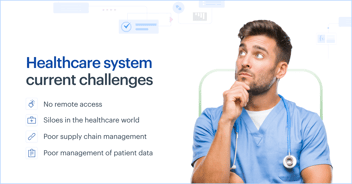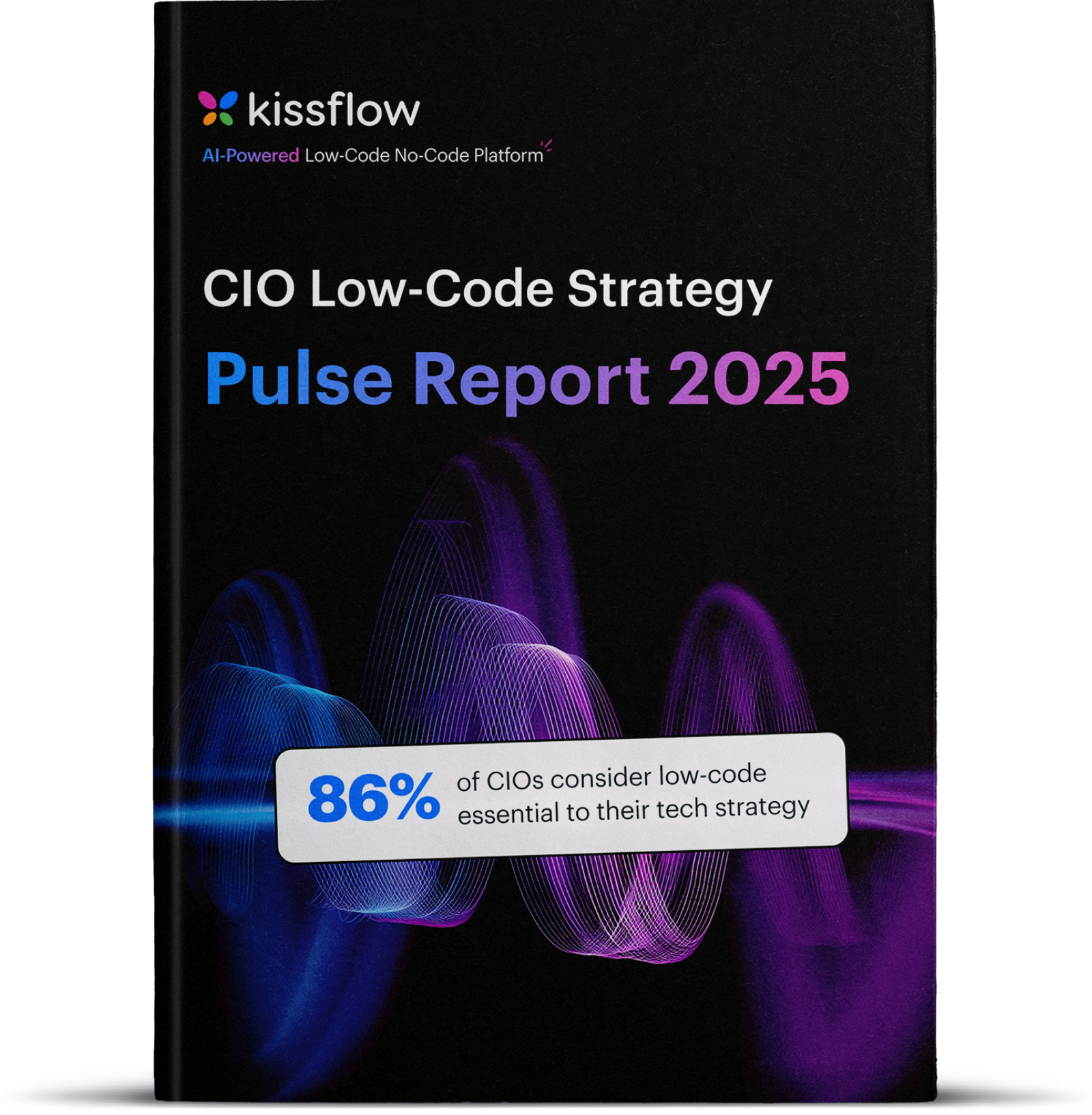
- >
- Solutions >
- How Digital Transformation is Shaping the Healthcare Industry
How Digital Transformation is Shaping the Healthcare Industry
In recent years, various industries have reported significant growth and improvement, which they owe to the growing adoption of digital technology. The healthcare industry is one of several industries where the huge impact of digital transformation is being felt today.
According to a report by Future Market Insights, the Cumulative Annual Growth Rate of Digital Transformation in the healthcare industry increased by about 10.4% between 2016 to 2020. This is expected to improve in the coming years, with a projected growth rate of about 14% by 2031.
The current uptrend in adopting digital technology in the healthcare industry isn’t surprising. When implemented in a targeted and efficient way, digital transformation results in a widespread improvement in patient care quality.
This article will dive deep into how digital transformation changes the healthcare ecosystem and the key benefits of adopting digital healthcare management using practical use cases and examples.
Enhance patient management efficiency with our Patient Management App.
How digital transformation is revolutionizing healthcare management?
The term digital transformation is the use of digital technologies to fundamentally change how a business operates and delivers value to its customers. For the healthcare industry, this means adopting digital technologies to improve and streamline everyday hospital operations, healthcare delivery, and the overall patient experience.
Digital transformation in healthcare management impacts the industry's consumers (patients) and workers.
- It allows hospitals to meet the demands of patients in the most efficient way possible.
- It changes how they work, collect patient data, and interact with patients.
Typically digital transformation involves automating critical but repetitive tasks and workflow in healthcare delivery, such as:
- Filling prescriptions
- Appointment reminders
- Result delivery
- Patient identity management
- Other complex tasks
Automation can relieve pressure on health workers and reduce patient frustration. For optimal results, one has to ensure that the automation system remains personalized with human interactions where necessary.
Benefits of digital transformation in Healthcare
Digital transformation in healthcare enables the real-time monitoring of vital health indicators through the use of wearables and other cutting-edge gadgets, enhancing patient care, and improving the overall efficiency and effectiveness of healthcare services.

Here are some key benefits why is digital transformation important in healthcare:
1. Improved patient outcomes
The different digital innovations bundled into a digital transformation plan can help physicians and healthcare providers optimize their workflows. It also ensures that they're getting and utilizing patient data and other metrics more accurately. This helps them to deliver effective treatment to patients within a shorter time frame.
2. Enhanced patient experience
Leveraging digital tools helps healthcare providers deliver more personalized, convenient, and optimized patient services. Digital healthcare leads to more accurate record keeping, faster diagnoses, and more effective treatment.
3. Increased efficiency
At the most basic level, digital transformation helps healthcare providers replace time-consuming manual paperwork with automated digital processes. This enables easier, and more convenient access to patient data. Healthcare providers can also leverage digital tools to streamline day-to-day operations and optimize workflows.
This leads to improved efficiency in the healthcare delivery process. Process automation in healthcare services also helps to minimize costs and leads to greater efficiency of resource management in traditional healthcare delivery.
4. Real-time data analytics
Digital transformation places a lot of emphasis on collecting accurate data. This is also important in healthcare services. Providers that prioritize digital transformation collect and analyze vast amounts of data to gain much-needed insights that can help improve the quality of care delivered to patients.
Data analytics also help providers identify new areas to optimize performance, new treatment opportunities, and better ways to optimize resource allocation.
5. Better collaboration and communication
Delivering patient care often involves collaboration and communication with various stakeholders within and outside a hospital's four walls. With digital systems, you can create a centralized database for patient data and provide role-based access to specific people involved in various phases of healthcare delivery.
For instance, when a patient is referred from one healthcare facility to another, a digitalized system helps transmit patient care information from the referring facility with no hitch or delay. This results in better care coordination and positive patient outcomes.
6. Increased patient safety
The processes and tools used to deliver digitized healthcare to patients can also help improve their safety and the overall quality of care they receive. Healthcare providers that use digital systems such as medication management systems, patient identification verification systems, electronic prescribing, and so on can avoid risks such as medication error and several other safety issues often encountered during patient systems.
Streamline doctor coordination using the Doctor Management App.
Use cases to focus on in the digital transformation journey
In the medical world, digital transformation has several practical applications, from medical diagnosis to patient monitoring and continuous management of patient health discharge.
In this section, we highlight various pain points in the medical industry and how digital transformation can help with them:
Automation
Automating processes and workflows is one of the biggest use cases of digital transformation. Physicians and other caregivers can benefit from a digitized process in the healthcare industry where repetitive tasks are automated and manual workflows are eliminated or streamlined. Many processes, such as patient discharge, information management, or follow-up, can be fully automated.
Speeding up workflows this way not only improves efficiency but also reduces the risk of human errors and reduces stress or fatigue faced by personnel. This is even more important today for industry pressure due to limited staff strength, a rise in chronic diseases, and changes in patient expectations.
Delivering an interconnected healthcare journey
Providers are discovering that an interconnected healthcare delivery process promises better outcomes for patients. Digitally-transformed healthcare organizations design a seamless and interconnected experience across the various stages of healthcare delivery.
Every step of a patient's life cycle is catered for digitally and linked by interoperable digital solutions, ensuring continuity in quality healthcare delivery at all times.
For instance, a connected ambulance system may collect and transfer vital patient data and send it to the appropriate department in the hospital even before the patient arrives. This way, doctors have all the data they need to provide faster and more efficient care as soon as a patient arrives. This data is also passed along as required as the patient moves through the healthcare delivery process.
Strategies for successful digital healthcare transformation implementation
The digitization of processes to achieve business transformation has been a dramatic game changer for everyone. However, achieving all-encompassing change requires a systematic approach with careful planning and execution.
The following are some of the key strategies healthcare organizations should keep in mind in implementing digital transformation:
Define clear goals
The first step in implementing a digital transformation initiative is clearly defining the goals and outcomes you have in mind. The goal differentiates between merely adopting a new tech tool and digital transformation. Setting goals also helps ensure that all stakeholders are fully aware of what needs to be done and are working towards the set objectives.
Engage stakeholders
All stakeholders, from key decision-makers to the clinicians, administrative staff, and IT personnel executing the digital transformation plan, need to be on board with your plan and aware of the goals. Engaging the stakeholders and onboarding them will ensure your initiative's smooth implementation.
Prioritize data security and privacy
Securing sensitive patient data is a top priority for the healthcare industry. Any digital transformation initiative must be executed with this in mind. All data you collect must be stored securely to make it accessible only to authorized personnel.
Provide adequate training
Your digital transformation plan's success depends on the people involved in executing it. Digital transformation often requires significant organizational processes and corporate culture changes. To ensure this smooth transition, you must invest in adequate staff training.
Start small and scale up
In implementing a digital transformation plan, one common mistake organizations make is to try to implement the initiative on a large scale right off the bat. However, successful digital transformation often takes shape gradually. It's more effective to start small and scale up gradually as required.
Monitor and evaluate performance
Digital transformation is a long-distance marathon and not a sprint. Monitoring your performance and evaluating the success of your initiative will ensure that you're always on track toward achieving desired outcomes. Look for metrics such as adoption, staff satisfaction, patient outcomes, and efficiency to determine where changes must be made to improve performance.
Case study to highlight how digital transformation can improve internal operations
Verisys is a Utah-based company founded in 1992. The company aggregates the data of healthcare professionals and providers. They also offer a range of data-driven services to help organizations in the healthcare industry maintain regulatory compliance, prevent fraud and mitigate risks across their provider network.
As a company that works with numerous clients in the healthcare sector, Verisys’ major problem was tracking internal processes effectively. The company needed a digital solution to track and automate approvals to increase efficiency and avoid errors commonly associated with manual approval workflows.
Verisys adopted Kissflow to achieve these goals. Keeping with the principle of starting small and scaling up, Verisys began by automating processes within the HR department and has been creating robust processes with Kissflow.
Verisys’s successful adoption of Kissflow and the many digital transformation benefits that came with it is a prime example of how a tool like Kissflow can help organizations in the healthcare and healthcare management service industries streamline and automate their workflow processes with ease and efficiency.
Revolutionize medical inventory tracking with the Pharmacy Management App
Growth of healthcare with digital transformation
More than just its impact on individual healthcare facilities, caregivers, and patients, digital transformation also has potential impacts on the entire healthcare industry. For every sector, achieving digital growth is the most critical growth pathway you can think of. This is true for the healthcare industry too.
Digital transformation changes how the healthcare industry navigates existing channels and introduces new ones to help them get the needed services. These essential consumer requirements determine how much they trust and value the system.
As with every industry, customer requirements and preferences have changed in the healthcare industry over the past few years. Patients now want personalized and highly efficient service; only digitally-matured providers can deliver this to them.
This is the power of digital transformation, and why businesses in the healthcare industry should embrace the change it promises.
Try Kissflow to transform end-to-end healthcare operations
Related Articles











